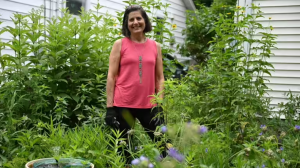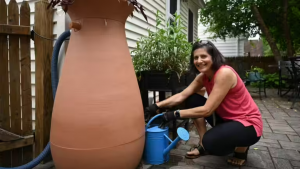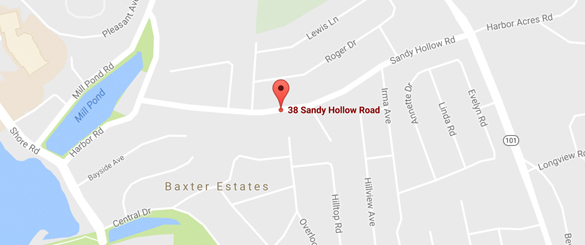Sustainable Garden Tour on June 18, 2022 – Organized by ReWild Long Island and The Port Washington Water District
As seen in
![]()
Bye-bye ‘hungry lawn.’ Port Washington garden tour stars pollinators and native plants, not grass

By Darwin Yanes
As temperatures and water usage begin to rise entering the summer months, environmentalists and officials in Port Washington have gotten a head start on implementing ways to help residents conserve water and keep costs low.
As part of the water district’s “Do It For Port” water conservation campaign, hamlet officials held the first “Sustainable Garden Tour” on Saturday, featuring six homeowners who showcased how native plants and pollinators require less water to survive, while still providing rich landscapes not dominated by lawns.
The water district partnered with ReWild Long Island, a nonprofit whose mission is to improve biodiversity and climate resilience through sustainable landscaping practices, to highlight how low-maintenance gardens can help decrease water usage.
Raju Rajan, co-founder and president of ReWild, said replacing lawn grass with native plants or organic vegetables — which don’t require fertilization or other chemicals — is good for the environment and household finances.
“By replacing the hungry lawn, many of us have dramatically cut our water consumption and water bill,” Rajan said.
The use of smart water meters, rain barrels and drip irrigation — a low-pressure lawn and garden watering system that delivers water to landscapes using a drip, spray or stream — also contribute to lower usage, Rajan added.
In Port Washington, where the district serves more than 9,400 accounts and 30,000 residents, water use nearly triples during the spring and summer months, Mindy Germain, commissioner of the Port Washington Water District, told Newsday. Half of that is from “inefficient and wasted methods of watering outside,” she noted.
“Rather than us just telling residents, we’ve engaged the voices of our own residents,” Germain said of the tour and other educational programs. “We feel a more informed community is a more resilient community. If you love Port, water less.”
Germain noted that by installing a smart irrigation monitor, which controls your watering schedule automatically by adjusting to weather conditions, some residents have seen a yearly decrease of 20% to 50% in water usage. She said the water district provides its own Landscape Irrigation Smart Controller Rebate Program. On average, about 38,150 gallons of water and $86 per year was saved between several homeowners who used the program, according to the water district.
As for the garden tour, Germain said having residents share their own success stories is more powerful than just teaching residents the methods to create a more sustainable garden.
“It’s a real demonstration of beautiful spaces that require less water, fewer chemicals and in the end, we’ll save our residents time and money, and we’ll really be helping the cause,” Germain said.
Joanne Strongin’s Port Washington home, which was a stop on the garden tour, features native plants like black-eyed susan vine, iris, milkweed and no-mow grass. On rainy days, she said she can skip a few days of watering because the plants need minimal irrigation. Strongin also uses a 65-gallon rain barrel to save water.

“I used to use my sprinkler and water my grass and plants, and half the water was dripping down the sidewalk … it’s wasteful,” Strongin said. “We’re really trying to encourage sustainable gardening, and we think it’s healthier for people, the community and the whole Long Island ecosystem.”




